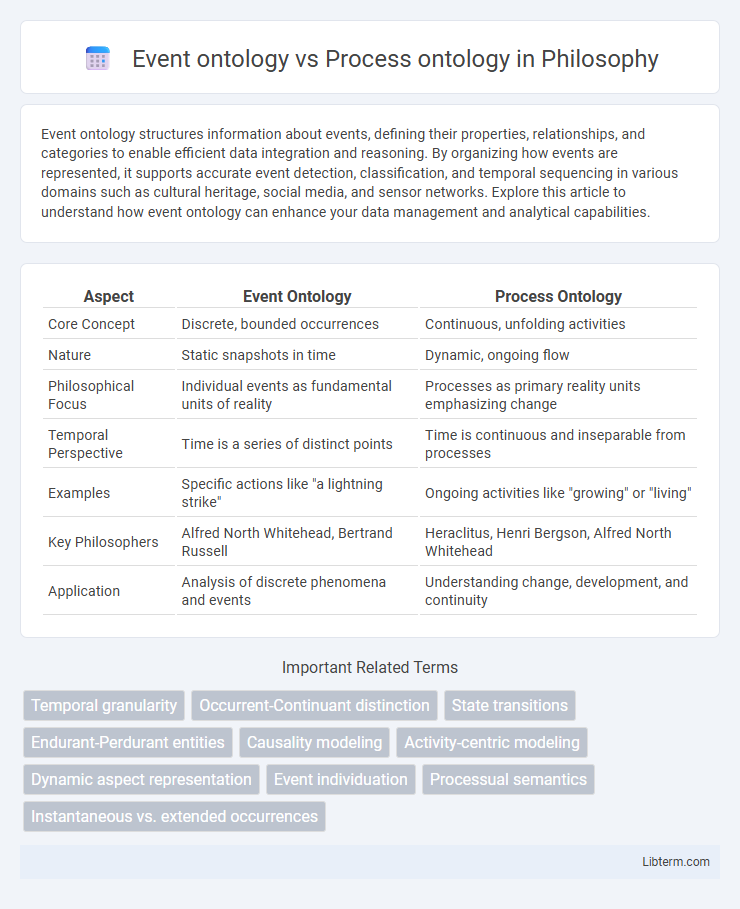Event ontology structures information about events, defining their properties, relationships, and categories to enable efficient data integration and reasoning. By organizing how events are represented, it supports accurate event detection, classification, and temporal sequencing in various domains such as cultural heritage, social media, and sensor networks. Explore this article to understand how event ontology can enhance your data management and analytical capabilities.
Table of Comparison
| Aspect | Event Ontology | Process Ontology |
|---|---|---|
| Core Concept | Discrete, bounded occurrences | Continuous, unfolding activities |
| Nature | Static snapshots in time | Dynamic, ongoing flow |
| Philosophical Focus | Individual events as fundamental units of reality | Processes as primary reality units emphasizing change |
| Temporal Perspective | Time is a series of distinct points | Time is continuous and inseparable from processes |
| Examples | Specific actions like "a lightning strike" | Ongoing activities like "growing" or "living" |
| Key Philosophers | Alfred North Whitehead, Bertrand Russell | Heraclitus, Henri Bergson, Alfred North Whitehead |
| Application | Analysis of discrete phenomena and events | Understanding change, development, and continuity |
Introduction to Ontologies: Event vs Process
Event ontology models discrete occurrences with defined temporal boundaries, emphasizing what happens at specific points in time. Process ontology captures ongoing activities or sequences that unfold continuously, highlighting their dynamic and temporal evolution. Understanding the distinction between event and process ontologies enables improved knowledge representation in fields like artificial intelligence and information systems.
Defining Event Ontology
Event ontology defines events as discrete occurrences localized in time and space, characterized by specific participants and outcomes. It emphasizes the temporal boundaries and causal relationships that distinguish one event from another, enabling precise modeling of dynamic changes. In contrast, process ontology views events as continuous, unfolding activities without strict temporal limits, focusing on transformation and flow over time.
Understanding Process Ontology
Process ontology defines real-world phenomena as dynamic sequences of events interconnected over time, emphasizing the evolving nature of processes rather than isolated occurrences. This ontology models processes by capturing temporal dependencies, causality, and the flow of states or actions, enabling detailed representation of complex workflows and state transitions. Understanding process ontology is crucial for applications in business process management, workflow automation, and semantic web services, where the comprehensive modeling of ongoing activities and their interrelations drives improved analysis and decision-making.
Core Differences Between Event and Process Ontologies
Event ontology centers on discrete occurrences with well-defined temporal boundaries and unique identities, emphasizing the causality and conditions surrounding specific events. Process ontology describes ongoing, dynamic activities without strict temporal limits, focusing on continuous change and the flow of states over time. The core difference lies in events being instantaneous or bounded happenings, whereas processes represent extended, evolving sequences that embody transformation and persistence.
Structure and Representation in Event Ontology
Event ontology emphasizes the temporal and contextual aspects of occurrences, representing events as entities with properties such as time, location, and participants. Its structure typically includes event classes, relationships, and attributes that capture dynamic changes and causal links, enabling precise modeling of complex scenarios. By contrast, process ontology focuses on sequences of actions or states, highlighting workflows and transformations rather than discrete occurrences.
Structure and Representation in Process Ontology
Process ontology emphasizes a dynamic structure representing sequences of events, activities, and transitions capturing temporal and causal relationships. It models processes as evolving entities with states and stages, enabling detailed representation of workflows and behaviors over time. This contrasts with event ontology, which focuses on discrete occurrences and their properties without necessarily modeling the continuous transformation inherent in processes.
Use Cases of Event Ontologies
Event ontologies enable detailed representation and analysis of occurrences in domains such as healthcare, finance, and cybersecurity by capturing temporal and causal relationships between events. They support complex event processing, real-time monitoring, and scenario simulation, enhancing decision-making and predictive analytics. Process ontologies primarily model workflows and activities, focusing on procedural sequences rather than event-driven dynamics, making event ontologies more suitable for applications requiring dynamic event correlation and context-aware reasoning.
Applications of Process Ontologies
Process ontologies are essential in modeling dynamic workflows, enabling automation and optimization in manufacturing, business process management, and software engineering. They provide a structured framework to represent sequences, dependencies, and temporal aspects of activities, enhancing interoperability and real-time monitoring. Applications include improving supply chain logistics, facilitating adaptive decision-making systems, and supporting complex event processing in distributed environments.
Challenges in Integrating Event and Process Ontologies
Integrating event and process ontologies presents challenges such as semantic misalignment due to differing conceptualizations of temporality and causality, complicating unified representation and reasoning. The heterogeneity in granularity and abstraction levels between event-centric and process-centric models hinders seamless interoperability and consistent data interpretation. Addressing these integration issues requires advanced ontology matching techniques and harmonization frameworks to align event occurrences with process workflows effectively.
Future Directions in Ontological Modeling
Future directions in ontological modeling emphasize integrating Event ontology and Process ontology to enhance dynamic representation of temporal and causal relationships. Advances in semantic web technologies facilitate richer, interoperable frameworks that capture real-world complexities by combining discrete occurrences (Events) with continuous activities (Processes). Research focuses on developing hybrid ontologies capable of supporting predictive analytics and adaptive systems through improved temporal reasoning and contextual awareness.
Event ontology Infographic

 libterm.com
libterm.com